
"I can't believe I mislaid an entire day!"
Phileas Fogg, played by David Tennant, utters these words in disbelief but also in celebration over a snifter of brandy in the finale of "Around the World in 80 Days."
It turns out that PBS' adaptation of the classic Jules Verne novel – despite many updates to the story – couldn't resist keeping the original twist ending the French author wrote in 1873. In the TV series, Fogg and his two traveling companions – valet Passepartout (Ibrahim Koma) and reporter Abigail "Fix" (Leonie Benesche) – make it back to England with plenty of time to win the wager of circumnavigating the globe in 80 days using modern transportation technology.
But just when they catch a whiff of victory, Fogg is detained on an arrest warrant, which should've been canceled after he was exonerated. He's finally released, but a day late . . . or so he thinks. Fogg's elderly valet Grayson (Richard Wilson) explains that by moving eastward through all the time zones in the prescribed period means the travelers think they're on Day 81, but they're actually a day behind. The friends literally run to the Reform Club and win the bet in the knick of time.
"We always wanted that fantastic twist," series co-creator and writer Ashley Pharoah tells Salon in a Zoom interview. "A lot of people haven't read that book, so I'm sure a lot of people didn't see that coming. I actually just extracted that speech from Jules Verne because if I were actually honest, I still couldn't explain to you quite how that works where they're a day ahead. But Jules Verne did so I just put that in there."
Although that ending is lifted straight from Verne, the rest of "Around the World" has updated and veered from the source material. The time period and general premise is the same, but Fogg's adventures and personality are less problematic than they were in the 19th century.
"When they approached me first I thought, 'Does the world really need another Phileas Fogg?'" said Pharoah. "At the time in the UK, we were going through a very bitter and nasty, divisive Brexit debate, and everything was a bit gray and closed down. I thought, here's an opportunity to tell a story, a family story just to show other cultures and just embrace that world of color, other people's cuisine and languages. It just seemed a really, ridiculously good thing to do that I got quite excited by that.
"And then of course, COVID came and none of us could travel for two years anyway. So yeah, I didn't mean for it to be quite that relevant."
Check out the rest of the interview with Pharoah, who discusses Tennant's version of Fogg, setting episodes on a deserted island and in the Old West, and where the show can go in season 2.
The following interview has been edited for length and clarity.
The Phileas Fogg seen in Verne's novel is a stickler for precision, timetables and predictability. He's incredibly confident, annoyingly so. Why did you create this new Fogg, who is rather meek and besieged with doubt?
He's the worst man in the world to go around the world. I think the Phileas Fogg from the book is a bit one-dimensional, that sort of Englishman where nothing seems to affect him. We thought about a man who's not very good at life. He's sat in that Reform Club for 20 years, eating the same food, saying the same thing to the same people. There's just the sense that he has so much to give, but he's this fearful of life.
Almost at the same time, David Tennant came on board and David as you know, has a very specific energy. So rather than having this sort of dull English gentleman, here was a man that seems almost with mental health issues. In episode 2, there's a problem where a sort of a alpha male has a slight go at him, and he just goes completely into his shell, goes into his carriage, rolls up in a ball. I think it's quite a brave bit of performance from David because in some ways, Fogg is not a very likable man at times. By the end, he's learned through the prism of the world and the journey to see who is and understand who he is.
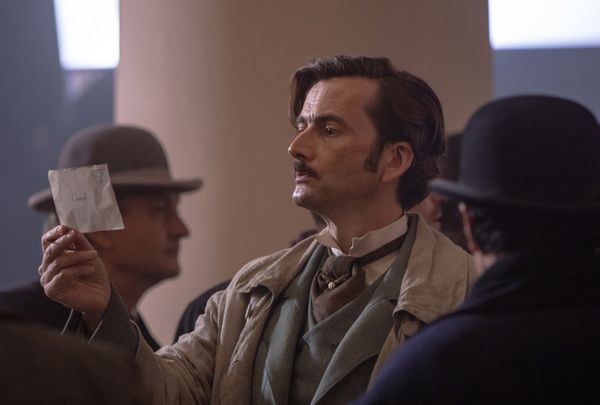
In the finale, we finally meet Estella (Dolly Wells), the woman Fogg abandoned 25 years ago just before they were supposed to travel the world. What led to that backstory and their meeting in Grand Central Station after all these years?
The core of that last episode for me are the Grand Central scenes where he meets Estella. We just stop the action and have two characters on a bench at a train station and have massive conversations about if he had had the guts back then. I just tried to imagine what it would have been like for him 25 years ago with those awful friends of his. He loved this woman, and she loved him back. [The friends] would have been jealous probably; the pressure they would have put on him. "Don't do it. It's not for people like you." And then his cowardice in actually going as far as the ship and getting off and letting her go.
So the idea was that for the first weeks, she sent a postcard from everywhere. She was in Rome or Paris saying, "Get back on the boat. You can still do this." She's the one back in episode 1 who sends him the postcard of that clock with the word "coward," almost goading him.
When they actually meet in America, he says, "Well, was it a good life?" and she said, "It was a life. There were wonderful things in it. And there are bad things in it. That's what life is. It's what you haven't done because you haven't had the courage." And her saying to him, "This is not over. You have to go back and show the men like Bellamy what you're made of," it just gave us that big engine into the last act really.
Want a daily wrap-up of all the news and commentary Salon has to offer? Subscribe to our morning newsletter, Crash Course.
Why is Bellamy (Peter Sullivan), Fogg's so-called friend, so against him? It was bad enough to start the wager, but as we saw from the telegram, he actually encourages his hired man to "use any means necessary," which could imply murder, to stop Fogg. And in the end, he took Fogg's money anyway, even though he lost the bet.
They're friends in the sense that they sit next to each other all day, but you can imagine what they were like in school. Bellamy would have bullied Fogg at school. And now he bullies him in the Reform Club. In the first episode when Fogg says, "You know what, I'm going to do it," you see this whiplash of anger in Bellamy. "How dare he? How dare you not be my patsy that I can bully every day?"
I think that for that sort of Englishman at that time, to suddenly be poor would've been just horrific. He's a victim of that class at that time, this weird sense of what being a man meant. The thoughts going through his head are like, "If I lose this bet I lose everything," which is what he does do in the end. He tries to bully him one more time, doesn't he? When he walks out he tries to keep his dignity but he's actually a ruined man. He's quite villainous
Fogg was better but still quite annoying with how high-handed he was treating Passepartout, who is his valet. Did David Tennant, who's also an executive producer on this, have any input into creating this Fogg?
He's such a precise actor. There was a scene, the first thing they shot was in episode 3 and he's in his hotel room in Arabia and Passepartout comes in. And all David did was just that [Pharoah spreads his arms out wide]. In other words, "Please take my shirt off now." That's not in the script at all, but it's so brilliant and visual.
I think for him the challenge of playing this up-and-down man is very intriguing, this sort of buttoned-down guy who in his past was once in love but an act of cowardice in the moment has damaged him. David didn't often say anything but when he did I really listened. It was always smart. It would be things like, "At the end of the episode, is that hook hard enough and big enough?" You go back and think, "Hmm, you're right; it's not."
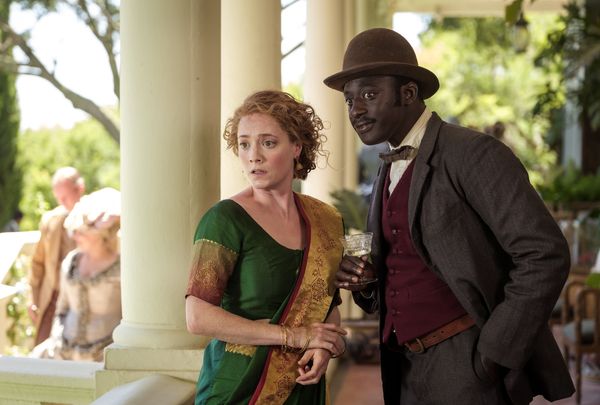
How did you conceive of both Passepartout, this incredibly savvy Frenchman, and Fix, a female journalist? What did you want from their characters, especially since it seems that Fogg sees them as equals almost, or at least partners in adventure, by the end?
It just amused me to have a valet who's so much better at going around the world than the man who is employing him. Passepartout's got his own backstories and difficulties and his own demons he has to overcome. So you see, as the journey goes on, they cease to be servant and gentleman and become by the end, almost good friends I think.
That's Fix too. Abigail Fix isn't in the novel, as you know. I was accused over here by some of the right-wing press of being woke by having a woman in the piece, let alone a Black Frenchman. That was never my intention, but purely as a dramatist, half the population I hear are women these days. Also, it would just be funny to have this Englishman who didn't spend any time with women – there are no women around down in the club – and she's suddenly at his side for going around the world.
Nellie Bly was a huge inspiration [for writing Fix]. I think she actually did go around the world; I think she did it in 72 days. I liked the idea that [Fix] is not just a journalist, not like her dad, just thrashing out copy. But she brings an emotional side to her prose. You know in that episode in Hong Kong, when she writes about Fogg – although it was a mistake – the actual piece of writing is a fine piece of writing. So that was my invention on my part I guess. But don't tell Jules Verne.
I was relieved that Fix was not supposed to be Fogg's love interest. When I saw the first images for the show, I was afraid that was going to happen.
He's damaged. He's nowhere near being ready for someone.
Instead you pair up Passepartout and Fix, who was the first person to see through his facade of being this servant. But it's not some fairy tale ending for them, as we see from their dance on the ship.
I watched that scene about 10 times. It was so touching because they're about to go back to London. You know being a Black man with a white upperclass woman is not going to be easy, but for five minutes they can just be themselves. So Fogg is missing Estella, and almost at the same moment they're dancing together. That just gave all three of them a way to slam into the ending.
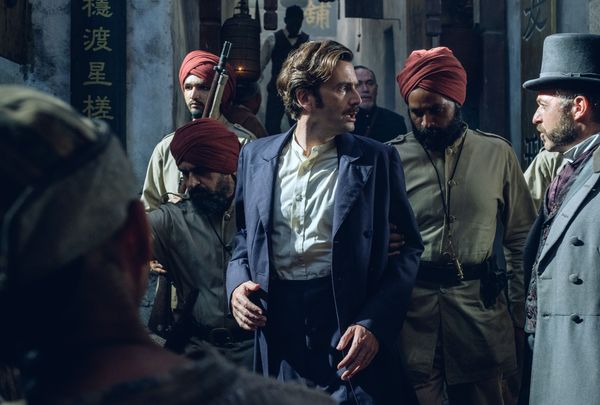
Let's go back to some of the episodes. I was surprised by quite a bit, including the Hong Kong episode in which Fogg is accused of stealing jewelry and even gets whipped for it. What were the discussions for including that scene? His friends save him but not until after he gets one lashing.
We talked about it a lot, obviously, because it is a family show. But in the end, I knew David would want to do it. I knew he wouldn't be afraid of pushing the material that way. And I feel like it's episode 5, and I bet everybody thought, "Oh are they gonna run in just as the chap's about to lash him?" And I thought, let's not do that.
I was a bit worried about having such a down ending for an episode, but I thought if we can't do it at that point in the narrative, you can never do it. So we thought collectively, "Let's go for it." I don't know what time it screens in America, but over here, it's been going out with BBC at 10 past six on a Sunday evening. We did get a few complaints about that, I'm afraid. But we didn't know when we were making it that BBC were going to show it at that time. That scene would have gone out before seven, which is for kids, probably a bit near the bone if you excuse the pun.
But also the thinking behind it is that you have Passepartout, who had made this massive error in taking a bribe and letting Fogg pay the price. Then you've got somewhere to go the next episode I think. The episode on the island works because of the Hong Kong episode, because you've got so much damage has been done to these three.
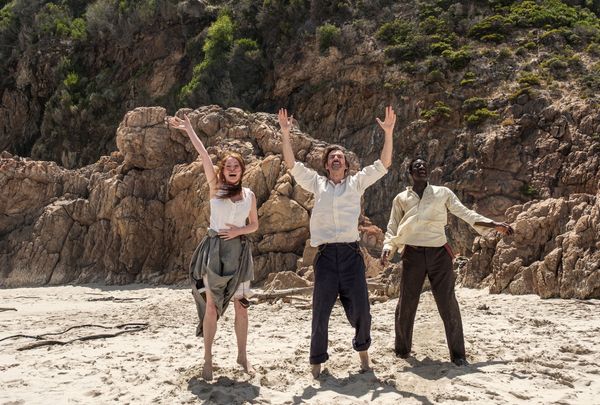
The desert island episode right afterward is such a departure for an "Around the World in 80 Days" story. Not only are they stuck, so there's not that race against time element, but they're also alone, so it's a three-hander at that point. What went into conceiving this episode?
It is what often happens in series television – you're sitting around saying, "Oh my god, we've run out of money. What are we going to do?" It's three characters basically on a beach for an hour. And luckily by then, you've had five, six hours of knowing these characters by now. So you know they all have secrets but they're all basically decent human beings who have made mistakes. So there's something delicious in watching all that stuff and them spinning out. David's very funny in it I think.
And finally Fix acknowledges how they've taken advantage of Passepartout and ignored his pain. His brother was killed at the beginning of the trip!
Yes, it's a very cathartic episode for all of them. Probably from that moment on, they are friends in a very different way than they were before. That's a classic thing about desert islands – everybody's the same. When you're fighting to survive, there are no servants and masters really.
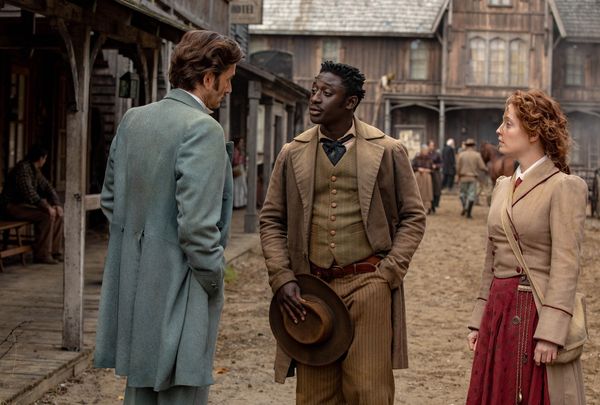
That episode was written by Stephen Greenhorn, a senior writer over here. He said, "Can I write a Western? I love Westerns an have always wanted to write a Western." That was his idea to use that real character. The sheriff in episode 7 was based on a real astonishing American character.
He wanted to use all the tropes of Westerns, like having the posse come after them. It was also a way of taking our three characters out of their comfort zone and letting them see what issues of race were like in America at the time in a harsher environment than England.
RELATED: The extraordinary resurgence of Jules Verne
I remember us talking about how high we wanted to bring in the race issues. But when they're in that carriage, the five of them cramped into those seats, it seemed impossible not to talk about it. [The prisoner] is sort of from Fogg's class. So when he gets on board, Phileas shakes his hand, just like he would with another gentleman. It's only when he started saying things about, "Aren't you meant to be looking after [Fix] for your best friend?" that Fogg is pulled into the tension.
Also, I can't remember the quote, but [the prisoner] says, "a place for everyone and everyone in their place." Sounds pretty fair, till you realize what he means; it's disgusting. We have gotten a bit of a bashing on some of the right-wing press, saying, "It's not in Jules Verne. Jules Verne . . . blah, blah." So I almost take that as a badge of pride that in annoys some of those people.
How was it decided that Fix would be the marksman of the group?
We wanted Fix not just to be a passive woman letting men fight. And then we thought, well she would [know how to shoot] from that class. They're very used to having guns, shooting pheasants, rabbits and foxes. So it makes complete sense. Whereas Fogg wouldn't go anywhere near a gun.
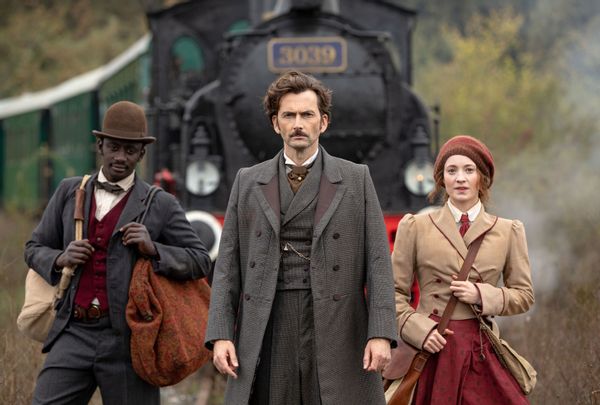
I think they all three realize what they've just had, they can't have that just being in London and normal again. The only way they can do that again is to have another adventure. My instinct was to have the three of them on their own again.
In the end they also discuss hearing about a sea creature, perhaps a narwhal. Is this merely a fun homage or do you think you'd want to tackle some aspect of Verne's "20,000 Leagues Under the Sea" for their next adventure?
I think we probably won't be doing that because Disney is doing a massive-budget version of that. Thank you, Disney. Thank you, mouse. "20,000 Leagues" is an incredible story, dark and strange. What Disney will do will be very interesting because it's not naturally a family story.
I also heard that you were adapting another Verne novel, "Journey to the Center of the Earth" for a separate project.
I'm just kicking around that idea to see if it can be done, probably not with these characters though. Again, those books are very dated in many ways. So I think you have to take quite radical steps to make them relevant to an audience. Technically I don't need to do it in period.
Verne has plenty of other stories – he had a series of "Extraordinary Voyages" – that could provide inspiration for the next installment of "Around the World."
When I do adaptations, I hope that will send some people back to the books because he is an astonishing novelist. I mean, the breadth of his imagination is incredible, the science.
The show actually has gone down very well over here. David Tennant wants to do more, which is great. After this I've run out of road; there's no more book for me to use, but writing those three characters again will be fun. So whether we use other Verne book and put them in there, or whether I come up with a completely new adventure remains to be seen. But it feels to me like there are legs in those three.
More stories to read:







